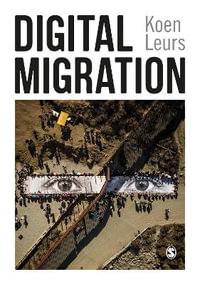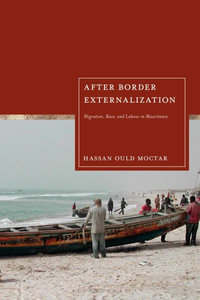For nearly thirty years the Berlin Wall symbolised a divided Europe. In the euphoric aftermath of the Cold War, the advent of a new 'borderless' world was hailed, one in which such barriers would become obsolete. Today these utopian predictions have yet to be realised. European governments have enacted the most sustained and far-reaching border enforcement program in history in an attempt to repel migrants seeking work or asylum. Detention and deportation, physical and bureaucratic barriers, naval patrols and satellite technologies: all these form part of the militarised response to immigration adopted by European governments, the human cost of which is often overlooked. These efforts have generated a tragic confrontation between some of the richest countries in the world and a stateless population from the poorest - a clash that occurs within Europe's territorial frontiers and also far beyond them. Fortress Europe investigates that confrontation on Europe's 'hard borders.' In a series of searing dispatches, Carr speaks to border officers and police, officials, migrants, asylum-seekers, and activists.The result is a unique and groundbreaking critique of Europe's exclusionary borders, and an essential guide to the wider drama of migration that will dominate politics for years ahead.
Industry Reviews
'Fortress Europe shines a light on Europe's hidden war against immigration, whose devastating human cost is often ignored. Through powerful first-hand reporting from the front lines, Matthew Carr reminds us that migrants are not barbarians at the gates but human beings who, like us, aspire to a better life.' -- Philippe Legrain, author of Immigrants: Your Country Needs Them
'A new book which captures the unravelling of the EU's liberal dream ... [Carr] seeks to remind us that migrants are not barbarians at the gate but human beings who, like us, aspire to a better life. He also highlights the spread of criminal, abusive, exploitative, and human trafficking.' -- Irish Examiner
'Carr argues that the combination of internal liberalisation and external hardening has increased criminal, abusive, and often deadly human trafficking, while only modestly reducing immigration. The unique virtue of the book lies in Carr's reporting from the brutal frontiers of the new Europe: Ukrainian border towns where illegal trafficking thrives, Spanish territories in Morocco where would-be immigrants are shot dead or left to die in the Sahara after attempting to scale razor-wire fences, Italian and Maltese islands where overfilled boatloads of Africans drown by the hundreds.' -- Foreign Affairs
'Carr travels to remote borderlands of Poland, Spain, Greece, and Malta; Schengen-bordering countries like Turkey and Morocco that collaborate in enforcement; and the heart of western Europe and Britain to meet immigrants stuck in remote detention centers or "living rough" on city streets for years, as well as temporary workers and sex slaves abused by their handlers and abandoned by governments. But Carr also depicts ordinary Europeans who have gone to great lengths to help these stranded travelers. This disturbing but hopeful book humanizes the face of 21st-century immigration.' -- Publishers Weekly
'Military patrols using live ammunition against unarmed men, women and children scaling barbed wire fences, captains dumping their human cargo in the sea after being detected by the navy: These are scenes not from North Korea or divided Berlin, but from the modern-day European Union... Employing a personable, readable style, the author shares vignettes from his extensive travels along Europe's outer reaches, from the African exclaves of Ceuta and Melilla to the Greek archipelago to the Slovakian-Ukrainian border... An unflinching look inside.' -- Kirkus Reviews
'An eye-opening journey around the periphery of Europe, observing humanity on the move and injustice in action. ... A gripping, troubling, shocking account.' -- Philippe Sands, QC, author of Torture Team: Rumsfeld's Memo and the Betrayal of American Values
'Sane and lucid, these dispatches from Europe's increasingly militarised borders expose a human rights disaster unfolding in our midst. Matthew Carr brings humanity and a measured sense of history to a subject more often marked by hypocrisy and hysteria.' -- Maya Jaggi, critic and cultural journalist
'With a relentless blade, Matthew Carr's Fortress Europe exposes layer after layer of the dark side of the new Europe: the proliferation of militarised borders, brutal camps for immigrants and asylum seekers, and a burgeoning racism and xenophobia. This is a crucial book for anyone seeking to understand how dreams of unfettered personal freedom and mobility for all transformed into a Europe dominated by ranks of gates, cordons, biometrics and camps.' -- Professor Stephen Graham, Newcastle University
'Fortress Europe gives depth to European border issues by combining historical and political analysis with multi-sited empirical research, and most importantly by raising the voices of irregular migrants. [...] With its eye-opening depictions, strong moral position and thought-provoking proposals, there is no doubt that this book will appeal to a broad public, nurturing critical discussions about border-related policies and practices and the future of the "gated continent".' -- Council For European Studies, Columbia University
'A brilliant, richly informative, thought-provoking read ... Fortress Europe stands out from other works on the same subject by its depth, building to its beautifully crafted finale in which Carr shows how borders are also bridges, because it is there that "linguistic, religious and ethnic categories merge." Journalist by profession, Carr is a historian at heart. His book broadens our horizons by reminding us that it is in the borderlands and not the borders, that our future lies. Exceptional.' -- Liz Fekete, Director of the Institute of Race Relations
'Matthew Carr's Fortress Europe is a powerful indictment of the inhumanity of the EU's policies towards refugees...it is a brilliantly researched book, rich in compassion and humanity.' -- Counterfire
























